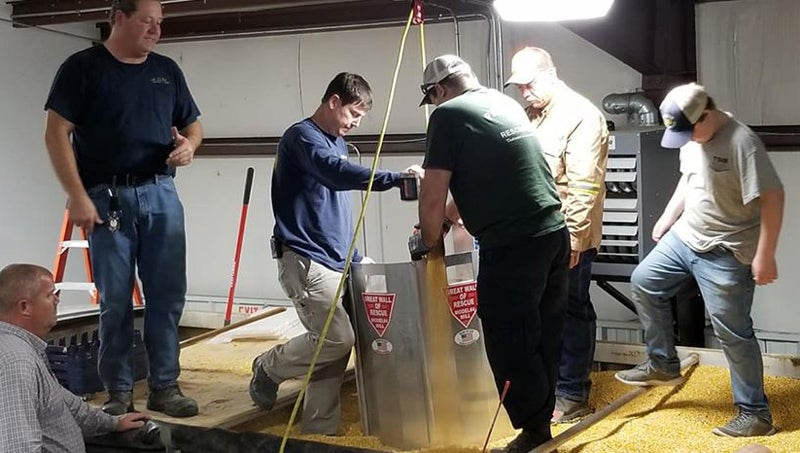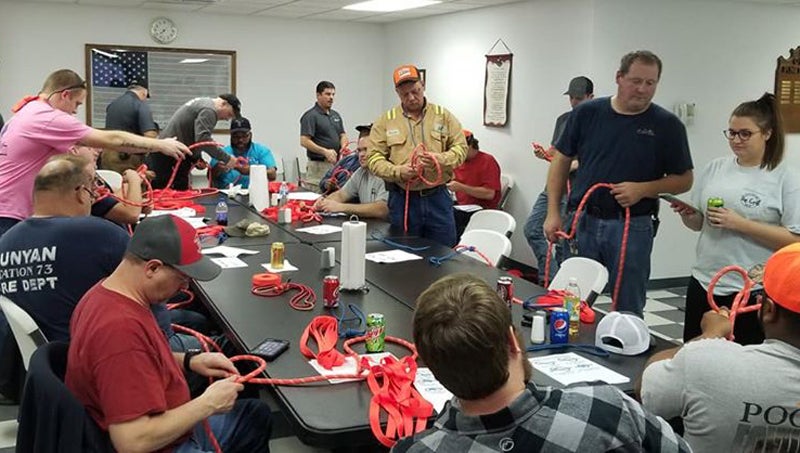New countywide rescue group offers specialized training
Published 8:40 pm Wednesday, December 18, 2019

- SPECIAL TACTICS: Members of the newly formed Beaufort County Special Operations Unit practice rescuing a victim from a grain bin at Pinetown Fire Department on Tuesday night. The new group was established to offer specialized training and foster cooperation between local departments during unusual emergency situations. (Aurora VFD)
A new, countywide rescue group is bringing together first responders from departments throughout Beaufort County to learn specialized rescue skills and ensure quick response for unusual emergencies.
The Beaufort County Special Operations Unit held its first training session Tuesday night at the Pinetown Volunteer Fire Department, practicing knots and rope skills, then techniques for rescuing a victim from a grain bin.
“The (fire) chief’s association came together and approved to go forward with a special operations unit so they can have their manpower trained on special techniques and tactics used in special operations,” said first responder Ted Wallace, one of the organizers of the group.
Some of the specialized skills team members will learn include high-angle and low-angle rescues, rescuing people from trenches and confined spaces, search and rescue, hazmat and water rescues.
By having members from throughout the county, who can assist each other in times of need, the group will be able to quickly deploy the right people with the right training and equipment to respond to a variety of situations.

TIED RIGHT: Members of the Beaufort County Special Operations Unit practice knot tying skills during Tuesday’s training. (Aurora VFD)
Wallace understands well the importance of interagency cooperation and coordination during emergency situations. He is a member of the Aurora Volunteer Fire Department, Pinetown Volunteer Fire Department, Bath Volunteer Fire Department, the Sidney Dive Team, Pinetown Rescue and EMS and the Regional Hazmat Team out of Williamston. He’s also the emergency response and security supervisor at Nutrien.
“We’re planning on cross-training from every fire department, getting four or five people trained in the special operations unit so when their department has an emergency, they can ask for the assets from throughout the county,” Wallace explained. “They’ll still have command and be trained to use those assets when they show up. It makes it a whole lot smoother operation.”
The first interest meeting for the Beaufort County Special Operations Unit brought about 29 people who wanted to undergo the training. With this type of team in place locally, the hope is Beaufort County’s first responders can be less reliant on outside teams from other counties.
“During a hurricane, when you have demands throughout the state, getting special teams is going to be kind of hard,” Wallace said. “It could be 72 hours before you get a special team in, with everything else that’s going on. Our main idea is to focus it on handling it in-house ourselves first, then if we had an outside organization that we would need, that would be a last resort.”
From an emergency management standpoint, Beaufort County Operations Chief of Fire/Emergency Management Chris Newkirk says the coordination will only strengthen emergency response in Beaufort County.
“When you look at the response of a fire and EMS agency, the majority of those calls are EMS, and next to that are motor vehicle accidents,” Newkirk said. “When you combine those two call types, you’re looking at about 80-85% of the calls you’re going to encounter in a year. Our responders are very well versed on EMS calls and motor vehicle accidents. But every once in a while, you have this out-of-the-blue emergency where it is the first time it has happened, or it hasn’t happened in a long time. This group is trying to address some of those calls, the type of calls that are significant in nature, but that we don’t encounter very often.”
Newkirk added that in a roundabout way, specialized trainings such as these also act as a recruitment and retention tool for local departments. On the one hand, it exposes existing members to new tactics. At the same time, it generates new excitement and interest among prospective members as well, Newkirk says.
The next training for the group will take place in January at Aurora VFD, where members will learn about atmospheric monitoring, high-angle rescues and rappelling.





